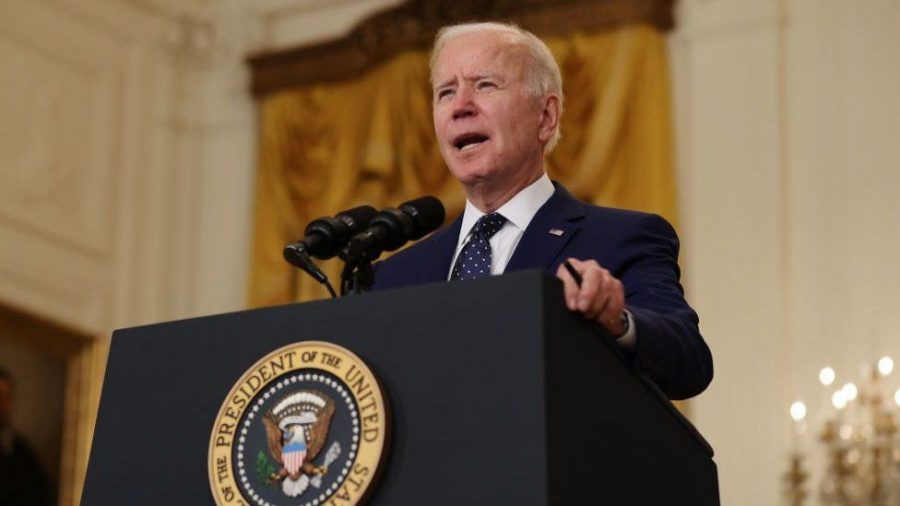Biden hosts international climate summit, countries set new targets to reduce greenhouse gas emissions
Biden pursues reclamation of global leadership in fight against global warming
April 27, 2021
President Joe Biden held a virtual international climate summit on April 22 to reestablish reducing greenhouse gas emissions as a global priority. Forty international leaders attended the discussion of confronting climate change and committing to improve.
As the United States is the world’s second leading emitter (secondary to China), “President Biden took action his first day in office to return the United States to the Paris Agreement. Days later, on January 27, he announced that he would soon convene a leaders summit to galvanize efforts by the major economies to tackle the climate crisis,” according to the White House. Biden has taken measures towards reconstructing the participation of the US towards cutting emissions following Former President Donald Trump’s withdrawal from the Paris Agreement, “a landmark international accord that was adopted by nearly every nation in 2015 to address climate change and its negative impacts,” according to the NRDC.
Biden initiated commitments by vowing to reduce greenhouse gas emission by 50-52% by 2030. According to CNBC, this target is more than double the commitment of the Obama Administration in 2015 in the Paris Agreement of a 26-28% cut below 2005 emission levels by 2025, which has not yet been met by even half.
Biden announced this target in alignment with scientists’ warnings of a 1.5 degree Celsius planetary warming limit to prevent severe impacts.
In a press release on the White House website from March 26, the administration stated, “A key goal of both the Leaders Summit and COP26 will be to catalyze efforts that keep that 1.5-degree goal within reach. The Summit will also highlight examples of how enhanced climate ambition will create good paying jobs, advance innovative technologies, and help vulnerable countries adapt to climate impacts … In his invitation, the President urged leaders to use the Summit as an opportunity to outline how their countries also will contribute to stronger climate ambition.”
Below are some of the contributions of attending countries:
- Prime Minister Yoshihide Suga raised Japan’s target for cutting emissions to 46% by 2030, up from 26%. (Reuters)
- Canada’s Prime Minister Justin Trudeau raised Canada’s goal to a cut of 40%-45% by 2030 below 2005 levels, up from 30%. (CBC)
- China has vowed to reach peak emissions by 2030 and be carbon neutral by 2060, however, their plans remain unclear. (Washington Post)
- British Prime Minister Boris Johnson announced that Britain would slash emissions by 78% by 2035. (Reuters)
- Brazil President Jair Bolsonaro vowed to end illegal deforestation in the country by 2030 and achieve carbon neutrality by 2050. (Reuters)
- Indian Prime Minister Narendra Modi re-confirmed the country’s vow to install 450 gigawatts of renewable energy by 2030. (Energy)
- South Korea President Moon Jae In pledged to end public financing of coal-fired power plants overseas and plans to unveil a stronger emissions reduction pledge. (Bloomberg)
- Russian President Vladimir Putin broadly pledged to “significantly” reduce the country’s emissions in the next three decades and said Russia makes a big contribution in absorbing global carbon dioxide.“Putin also said the country has nearly halved its emissions compared to 1990 and called for a global reduction of methane, a greenhouse gas that is 84 times more potent than carbon dioxide and a main driver of climate change.” (CNBC)
- Most of the countries did not offer new emissions goals. (Reuters)
President Biden commented on the severity and timeliness of the issue: “This is a moral imperative. An economic imperative. A moment of peril, but also a moment of extraordinary possibilities,” he said.
Biden stresses these efforts in an attempt to reevaluate Former President Trump’s negligence of climate preservation. According to CNBC, during Trump’s term he had “pulled out of the Paris accord, halted all federal efforts to reduce domestic emissions and rolled back more than 100 environmental regulations to favor fossil fuel production.”
An analysis by the Climate Action Tracker found that for the United States to effectively limit the global temperature rise to 1.5 degrees Celsius, 57% of emissions need to be cut by the end of the decade.
Biden’s summit is the first of many meetings to come confronting the climate crisis. Annual United Nation climate talks are to convene in November in Scotland where approximately 200 countries will update their climate pledges under the Paris Agreement.






